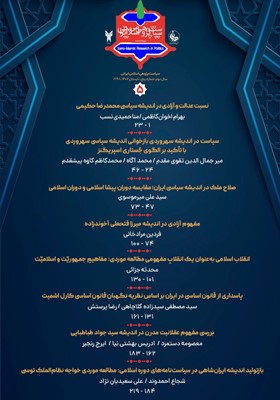نسبت عدالت و آزادی در اندیشه سیاسی محمدرضا حکیمی
محورهای موضوعی : تحولات سیاسی در ایران
بهرام اخوانکاظمی
1
*
![]() ,
منا حمیدی نسب
2
,
منا حمیدی نسب
2
1 - استاد گروه علوم سیاسی، دانشگاه شیراز، شیراز، ایران
2 - دانشجوی دکتری علوم سیاسی، دانشگاه شیراز، شیراز، ایران
کلید واژه: اقتصاد, آزادی, عدالت, محمدرضا حکیمی, حکومت,
چکیده مقاله :
ﻋﺪاﻟﺖ و آزادی از ﻣﻔﺎﻫﯿﻢ ﺑﻨﯿﺎدﯾﻦ و اﺳﺎﺳﯽ ﺟﺎﻣﻌﻪ ﺑﺸﺮی اﺳﺖ ﮐﻪ راﺑﻄﻪ اﯾﻦ دو ﻫﻤﻮاره ﻣﻮرد ﺗﻮﺟﻪ اﻧﺪﯾﺸﻤﻨﺪان ﻋﻠﻢ ﺳﯿﺎﺳﺖ ﺑﻮده اﺳﺖ. آﻧﭽﻪ ﺑﯿﺶ از ﺗﺤﻠﯿﻞ ﻣﻮردی اﯾﻦ ﻣﻔﺎﻫﯿﻢ ﻣﺴﺎﻟﻪ ﺳﺎز ﺑﻮده، ﺗﺤﻠﯿﻞ اﯾﻦ دو ﻣﻔﻬﻮم ﻧﺴﺒﺖ ﺑﻪ ﯾﮑﺪﯾﮕﺮ اﺳﺖ ﮐﻪ ﻣﺤﻞ ﺑﺮوز آراء ﻣﺨتلف و ﻣﮑﺎﺗﺐ ﮔﻮﻧﺎﮔﻮﻧﯽ شده اﺳﺖ. یکی از متفکران عصر حاضر که به مسئله عدالت به عنوان محور اساسی یک جامعه دینی برای نیل به سعادت می نگردد محمدرضا حکیمی است. او که از پیروان مکتب تفکیک است مرکز ثقل اندیشه خود را بر عنصر عدالت قرار داد و تمام مناسبات سیاسی و اجتماعی و اقتصادی حکومت اسلامی را متاثر و در نحوه تعامل با این عنصر قوام بخش می داند. آنچه مطمح نظر نویسنده است بررسی جایگاه این عنصر نسبت به مفهوم دیگری نظیر آزادی است. چرا ﻫﺮﭼﻪ ﺟﻮاﻣﻊ ﭘﯿﭽﯿﺪه ﺗﺮ ﻣﯽ ﺷﻮد، ﺳـﺨﻦ از ﻋـﺪاﻟﺖ، آزادی و راﺑﻄـﻪ اﯾـﻦ دو در ﺳﺎﺣﺖ ﻫﺎی ﮔﻮﻧﺎﮔﻮن زﯾﺴﺖ ﺟﻤﻌـﯽ و ﺳـﺎﺧﺘﺎرﻫﺎی ﮐـﻼن اﺟﺘﻤـﺎﻋﯽ دﺷـﻮارﺗﺮ ﻣـﯽ ﺷـﻮد. اهمیت این مسئله، ضرورت ﺗﻮﺟﻪ ﺑﻪ اﻧﺪﯾﺸﻪ ﻫﺎی اﺳﻼﻣﯽ و ﺑـﻮﻣﯽ را مطرح می سازد که ﻣـﯽ ﺗﻮاﻧـﺪ زمینه را بر ترسیم نقشه راه متناسب تر با زیست و حیات سیاسی جوامع اسلامی هموار سازد. بر این اساس در پاسخ به این پرسش که چه نسبتی بین این دو مولفه در دیدگاه علامه حکیمی برقرار می شود؟ می توان گفت در دیدگاه ایشان رابطه مستقیم و قوام بخشی بین دو عنصر عدالت و آزادی وجود دارد؛ به گونه ایی که اگر آزادی نباشد نیل به عدالت امکان پذیر نخواهد بود.
Justice and freedom are the basic concepts of human society, and the relationship between these two has always been the focus of political science thinkers. What is more than the case analysis of these problematic concepts, is the analysis of these two concepts in relation to each other, which has become the place for different opinions and different schools. One of the thinkers of the present age who does not consider the issue of justice as the basic axis of a religious society to achieve happiness is Mohammad Reza Hakimi. He, who is a follower of the separation school, put the center of gravity of his thought on the element of justice and considers all the political, social and economic relations of the Islamic government to be affected and consistent in the way he interacts with this element. What the author's opinion suggests is to examine the position of this element in relation to another concept such as freedom. Why, as societies become more complex, it becomes more difficult to talk about justice, freedom, and the relationship between the two in various areas of social life and macro-social structures. The importance of this issue raises the need to pay attention to Islamic and indigenous thoughts, which can pave the way for drawing a road map that is more suitable for the life and political life of Islamic societies. Based on this, in response to the question, what is the relationship between these two components in Allameh Hakimi's view? It can be said that in his view there is a direct and consistent relationship between the two elements of justice and freedom; In such a way that if there is no freedom, it will not be possible to achieve justice.
_||_

